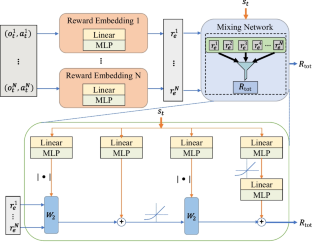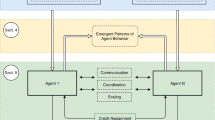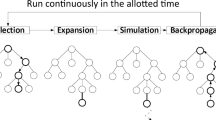Abstract
Credit assignment poses a significant challenge in heterogeneous multi-agent reinforcement learning (MARL) when tackling fully cooperative tasks. Existing MARL methods assess the contribution of each agent through value decomposition or agent-wise critic networks. However, value decomposition techniques are not directly applicable to control problems with continuous action spaces. Additionally, agent-wise critic networks struggle to differentiate the distinct contributions from the shared team reward. Moreover, most of these methods assume agent homogeneity, which limits their utility in more diverse scenarios. To address these limitations, we present a novel algorithm that factorizes and reshapes the team reward into agent-wise rewards, enabling the evaluation of the diverse contributions of heterogeneous agents. Specifically, we devise agent-wise local critics that leverage both the team reward and the factorized reward, alongside a global critic for assessing the joint policy. By accounting for the contribution differences resulting from agent heterogeneity, we introduce a power balance constraint that ensures a fairer measurement of each heterogeneous agent’s contribution, ultimately promoting energy efficiency. Finally, we optimize the policies of all agents using deterministic policy gradients. The effectiveness of our proposed algorithm has been validated through simulation experiments conducted in fully cooperative and heterogeneous multi-agent tasks.










Similar content being viewed by others
Data Availability
The data that support the findings of this study are available on request from the first author.
References
Vinyals O, Babuschkin I, Czarnecki WM, Mathieu M, Dudzik A, Chung J, Choi DH, Powell R, Ewalds T, Georgiev P et al (2019) Grandmaster level in starcraft ii using multi-agent reinforcement learning. Nature, 350-354
Chen Y, Zheng Z, Gong X (2022) Marnet: Backdoor attacks against cooperative multi-agent reinforcement learning. IEEE Trans Dependable Sec Comput, 1-11
Liu X, Wang G, Chen K (2022) Option-based multi-agent reinforcement learning for painting with multiple large-sized robots. IEEE Trans Intell Transp Syst, 15707-15715
Chen YJ, Chang DK, Zhang C (2020) Autonomous tracking using a swarm of uavs: A constrained multi-agent reinforcement learning approach. IEEE Trans Veh Technol. 13702-13717
Zhou W, Chen D, Yan J, Li Z, Yin H, Ge W (2022) Multi-agent reinforcement learning for cooperative lane changing of connected and autonomous vehicles in mixed traffic. Auton Intell Syst
Dinneweth J, Boubezoul A, Mandiau R, Espié S (2022) Multi-agent reinforcement learning for autonomous vehicles: a survey. Auton Intell Syst, 27
Sun C, Liu W, Dong, L (2021) Reinforcement learning with task decomposition for cooperative multiagent systems. IEEE Trans Neural Netw Learn Syst, 2054-2065
Liu X, Tan Y (2022) Feudal latent space exploration for coordinated multi-agent reinforcement learning. IEEE Trans Neural Netw Learn Syst, 1-9
Yarahmadi H, Shiri ME, Navidi H, Sharifi A, Challenger M (2023) Bankruptcyevolutionary games based solution for the multi-agent credit assignment problem. Swarm Evol Comput, 101229
Ding S, Du W, Ding L, Guo L, Zhang J, An B (2023) Multi-agent dueling qlearning with mean field and value decomposition. Pattern Recognition, 109436
Du W, Ding S, Guo L, Zhang J, Zhang C, Ding L (2022) Value function factorization with dynamic weighting for deep multi-agent reinforcement learning. Information Sciences, 191-208
Rashid T, Samvelyan M, Schroeder C, Farquhar G, Foerster J, Whiteson S (2018) QMIX: Monotonic value function factorisation for deep multi-agent reinforcement learning. Proceedings of the 35th Int Conf Mac Learn, 4295-4304
Lowe R, Wu Y, Tamar A, Harb J, Abbeel P, Mordatch I (2017) Multiagent actor-critic for mixed cooperative-competitive environments. Adv Neural Info Process Syst, 6379-6390
Lyu X, Xiao Y, Daley B, Amato C (2021) Contrasting centralized and decentralized critics in multi-agent reinforcement learning. 20th Int Conf Auton Agents & Multiagent Syst, 844-852
Oroojlooy A, Hajinezhad D (2022) A review of cooperative multi-agent deep reinforcement learning. Appl Intell, 1-46
Wang J, Yuan M, Li Y, Zhao Z (2023) Hierarchical attention master-slave for heterogeneous multi-agent reinforcement learning. Neural Netw, 359-368
Mahajan A, Rashid T, Samvelyan M, Whiteson S (2019) MAVEN: multiagent variational exploration. In: Adv Neural Info Process Syst, pp. 7611-7622
Li W, He S, Mao X, Li B, Qiu C, Yu J, Peng F, Tan X (2023) Multiagent evolution reinforcement learning method for machining parameters optimization based on bootstrap aggregating graph attention network simulated environment. J Manuf Syst, 424-438
Qiu D, Wang J, Dong Z, Wang Y, Strbac G (2022) Mean-field multi-agent reinforcement learning for peer-to-peer multi-energy trading. IEEE Trans Power Syst, 1-13
Lee HR, Lee T (2021) Multi-agent reinforcement learning algorithm to solve a partially-observable multi-agent problem in disaster response. Euro J Oper Res, 296-308
Foerster J, Farquhar G, Afouras T, Nardelli N, Whiteson S (2018) Counterfactual multi-agent policy gradients. Proceedings of the AAAI Conf Artif Intell, 2974-2982
Guo D, Tang L, Zhang X, Liang YC (2020) Joint optimization of handover control and power allocation based on multi-agent deep reinforcement learning. IEEE Trans Veh Technol, 13124-13138
Hou Y, Sun M, Zeng Y, Ong YS, Jin Y, Ge H, Zhang Q (2023) A multi-agent cooperative learning system with evolution of social roles. IEEE Trans Evol Comput
Yang J, Nakhaei A, Isele D, Fujimura K, Zha H (2020) CM3: cooperative multi-goal multi-stage multi-agent reinforcement learning. In: 8th International Conference on Learning Representations
Nguyen DT, Kumar A, Lau HC (2017) Collective multiagent sequential decision making under uncertainty. Proceedings of the 31st Conference on Artificial Intelligence, 3036-3043
Du Y, Han L, Fang M, Liu J, Dai T, Tao D (2019) LIIR: learning individual intrinsic reward in multi-agent reinforcement learning. Adv Neural Inf Process Syst, 4405-4416
Sunehag P, Lever G, Gruslys A, Czarnecki WM, Zambaldi VF, Jaderberg M, Lanctot M, Sonnerat N, Leibo JZ, Tuyls K, Graepel T (2018) Value-decomposition networks for cooperative multi-agent learning based on team reward. Proceedings of the 17th International Conference on Autonomous Agents and MultiAgent Systems, 2085-2087
Son K, Kim D, Kang WJ, Hostallero DE, Yi Y (2019) Qtran: Learning to factorize with transformation for cooperative multi-agent reinforcement learning. Int Conf Mach Learn, p 5887-5896
Rashid T, Farquhar G, Peng B, Whiteson S (2020) Weighted qmix: Expanding monotonic value function factorisation for deep multi-agent reinforcement learning. Adv neural inf process syst, 10199-10210
Zhou D, Gayah VV (2023) Scalable multi-region perimeter metering control for urban networks: A multi-agent deep reinforcement learning approach. Transp Res Part C Emerg Technol, p 104033
Liu S, Liu W, Chen W, Tian G, Chen J, Tong Y, Cao J, Liu Y (2023) Learning multi-agent cooperation via considering actions of teammates. IEEE Trans Neural Netw Learn Syst, p 1-12
DENG H, LI Y, YIN Q (2023) Improved qmix algorithm from communication and exploration for multi-agent reinforcement learning. J Comput Appl, p 202
Zhang Y, Ma H, Wang Y (2021) Avd-net: Attention value decomposition network for deep multi-agent reinforcement learning. 25th International Conference on Pattern Recognition, p 7810-7816
Qin Z, Johnson D, Lu Y (2023) Dynamic production scheduling towards selforganizing mass personalization: A multi-agent dueling deep reinforcement learning approach. J Manuf Syst, 242-257
Wang X, Zhang L, Lin T, Zhao C,Wang K, Chen Z (2022) Solving job scheduling problems in a resource preemption environment with multi-agent reinforcement learning. Robot Comput Integr Manuf, 102324
Yu T, Huang J, Chang Q (2021) Optimizing task scheduling in human-robot collaboration with deep multi-agent reinforcement learning. J Manuf Syst, 487-499
Wu H, Ghadami A, Bayrak AE, Smereka JM, Epureanu BI (2021) Impact of heterogeneity and risk aversion on task allocation in multi-agent teams. IEEE Robotics and Automation Letters, 7065-7072
Zhao Y, Xian C, Wen G, Huang P, Ren W (2022) Design of distributed eventtriggered average tracking algorithms for homogeneous and heterogeneous multiagent systems. IEEE Transactions on Automatic Control, 1269-1284
Jiang W, Feng G, Qin S, Yum TSP, Cao G (2019) Multi-agent reinforcement learning for efficient content caching in mobile d2d networks. IEEE Trans Wirel Commun, 1610-1622
Jahn J (2020) Introduction to the theory of nonlinear optimization. Springer Nature
Author information
Authors and Affiliations
Corresponding author
Ethics declarations
Conflicts of interest
No potential conflict of interest was reported by the authors.
Additional information
Publisher's Note
Springer Nature remains neutral with regard to jurisdictional claims in published maps and institutional affiliations.
Rights and permissions
Springer Nature or its licensor (e.g. a society or other partner) holds exclusive rights to this article under a publishing agreement with the author(s) or other rightsholder(s); author self-archiving of the accepted manuscript version of this article is solely governed by the terms of such publishing agreement and applicable law.
About this article
Cite this article
Jiang, K., Liu, W., Wang, Y. et al. Credit assignment in heterogeneous multi-agent reinforcement learning for fully cooperative tasks. Appl Intell 53, 29205–29222 (2023). https://doi.org/10.1007/s10489-023-04866-0
Accepted:
Published:
Issue Date:
DOI: https://doi.org/10.1007/s10489-023-04866-0




